Our lab studies several neocortical contributions to episodic memory and decision-making using a
variety of techniques such as electroencephalography (EEG), functional magnetic
resonance Imaging (fMRI), transcranial direct-current stimulation
(tDCS), transcranial magnetic stimulation (TMS), and patient studies.
These studies range from investigations into prefrontal and parietal cortex activity associated with
shifts in decision criteria to attempts to uncover the sources variability of individual patterns of
brain activity during an episodic memory task. Ultimately, our goal is to use these neuroscientific
studies to understand the processes of the mind when remembering a past event or making a decision,
and to appreciate the uniqueness of these processes at the individual level.
- Criterion Shifting in Recognition Memory
- Split-Brain Research
- Hypothesis Formation and Evaluation
- Individual Variability
- Parietal Lobe Contributions to Memory
- fMRI methods
- Social Reasoning & Theory of Mind
- Code
Criterion Shifting in Recognition Memory
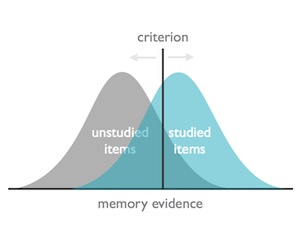
A critical aspect of recognition memory involves weighing the strength of memory evidence against a decision criterion. The placement of a decision criterion is affected by several factors, such as the probability of a target or the varying consequences of a miss versus a false alarm. In the past, we used criterion shift models to explain the high false alarm rate in the DRM false memory paradigm. More recently, we observed that some individuals willingly shift their decision criterion, while others will not shift their criteria at all. We are exploring the inherent characteristics that mediate an individual's willingness to shift their decision criterion when it is advantageous to do so. Further, we have exploited these individual differences in criterion shifting in order to better understand the fronto-parietal network of brain activity associated with successful memory recognition.
Split Brain Research
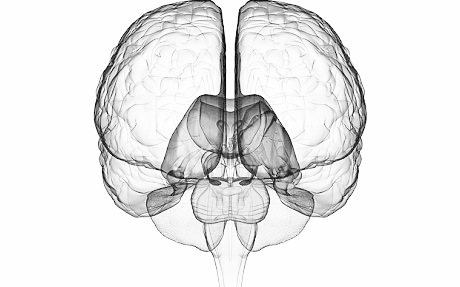
Our lab conducts studies of patients who have had their corpus callosum surgically severed due to severe epilepsy. These patients present a rare opportunity to understand the unique functionality of each hemisphere in isolation and the effect of severing inter-hemispheric communication. These studies range in topics from episodic memory to probability matching to moral reasoning.
Hypothesis Formation and Evaluation
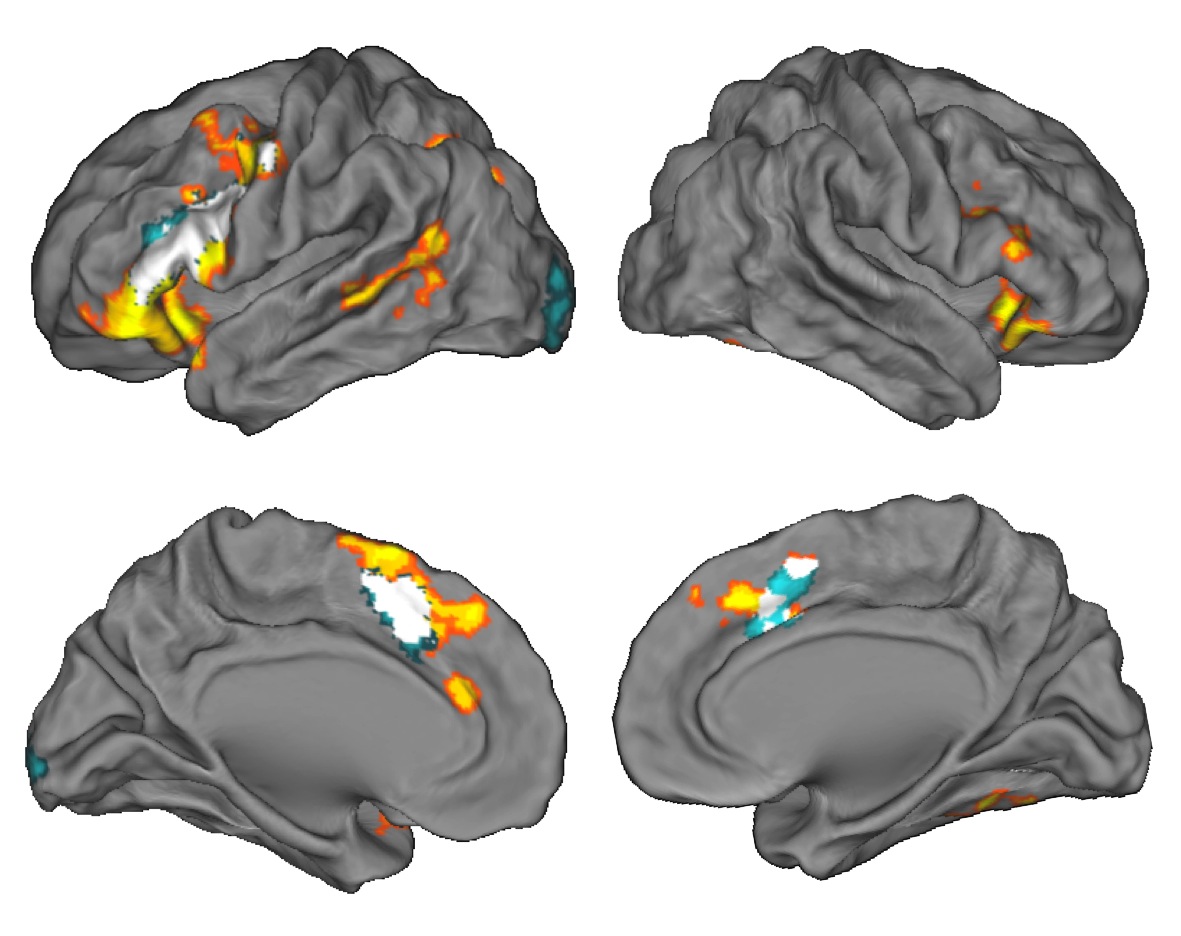
Areas in white denote regions associated with hypothesis formation and evaluation in healthy individuals.
One of the hallmarks of split-brain research is the left hemisphere's drive to interpret the world around it. Our goal is to understand and characterize this need of the human brain to form hypotheses. Specifically, we want to determine what propels an individual to seek an explanation, how hypotheses are generated, and what constitutes a good explanation. We are also interested in how the brain evaluates the plausibility and validity of its hypotheses. We believe the brains of healthy individuals strike a balance between hypothesis formation and evaluation, and a perturbation in this system may give rise to delusional disorders. Our ultimate goal is to uncover the neural processes that support hypothesis formation and evaluation in both healthy and deluded individuals.
Individual Variability in Brain Activity
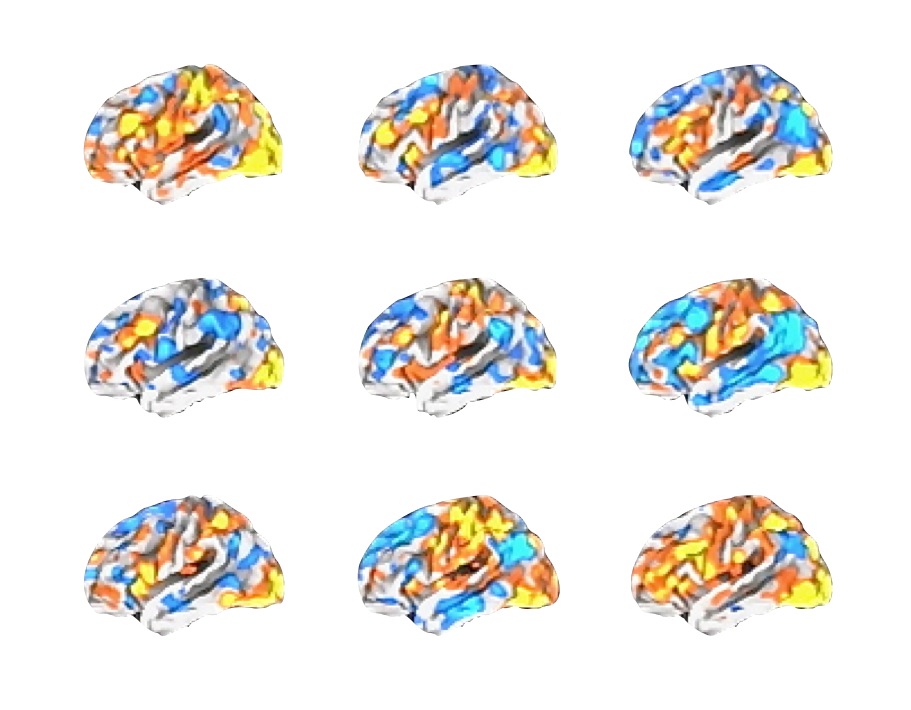
Brain activity associated with memory retrieval for nine individuals. Notice the variability between individual brain maps.
Neuroimaging studies typically rely on maps of brain activity that are an average across a group of subjects in order to increase statistical power. However, our studies have demonstrated that an individual map of brain activity is not unlike a fingerprint in its uniqueness and relative stability over time. A reliance on group maps can leave out a wealth of information at the individual level. We seek to understand the sources of this variability in brain activity given the variable and dynamic nature of episodic memory and decision-making.
Partietal Lobe Contributions to Memory
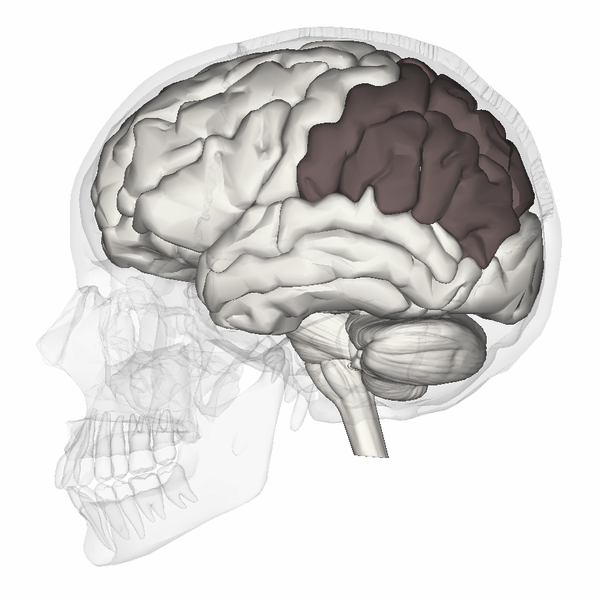
Parietal lobe activations are a ubiquitous finding in neuroimaging studies of recognition memory, but the functionality of this region remains a mystery. We have explored this functionality using a variety of source monitoring tasks and by manipulating decision processes during recognition memory tasks.
fMRI methods
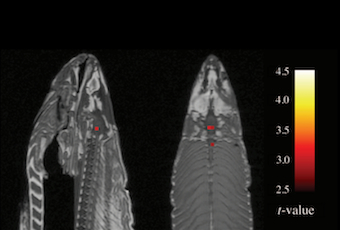
From the lab that found
"significant" fMRI activity in a dead salmon when NOT
correcting for multiple comparisons, a
new study suggests that most fMRI studies are underpowered
due to insufficient sample sizes. In fact, many fMRI studies
need sample sizes of 100+ participants to have reasonable reproducibility.
One goal of the lab is to improve the reliability and replicability
of fMRI findings by highlighting bad statistical practices and guiding
future fMRI studies with improved methods.
Yes we did scan another dead salmon and failed to replicate our
initial finding. Perhaps we just need a larger sample size.
Social Reasoning & Theory of Mind

In the real world, decision-making and reasoning usually occurs within a social context. We have conducted neuroimaging and patient studies that examine this issue with a consideration of specialized modules responsible for theory of mind attributions (that is, attributing beliefs and thoughts to other people).
Code

Check out our lab GitHub!
Data from published studies are available upon request at millerlab@ucsb.edu.
